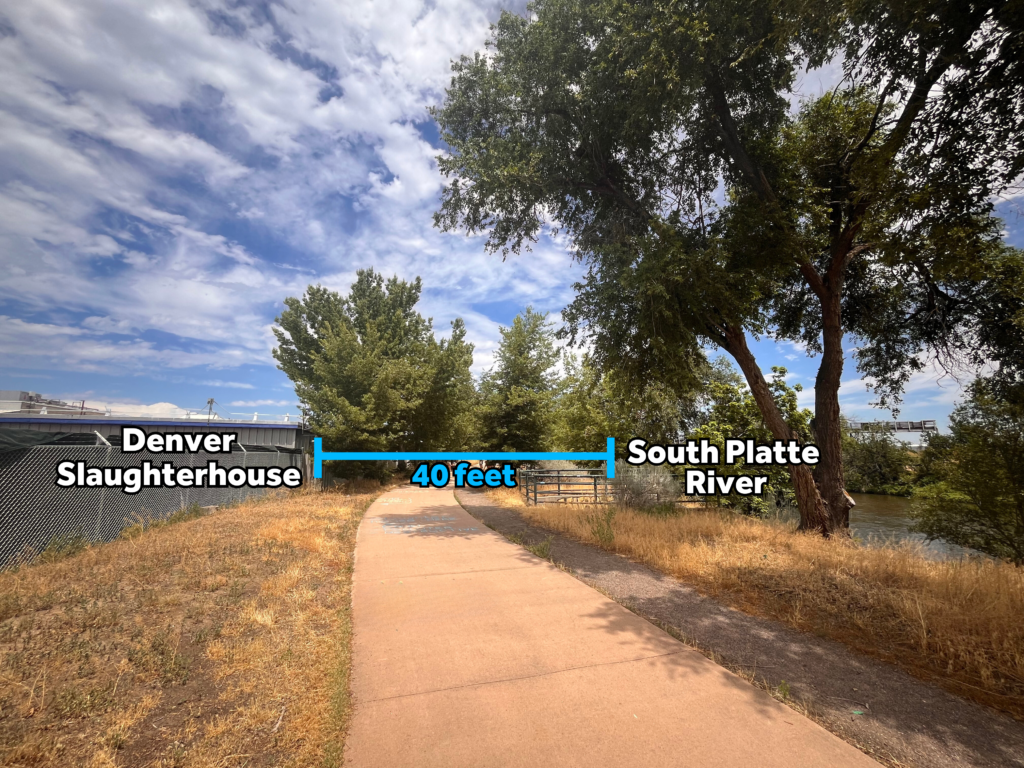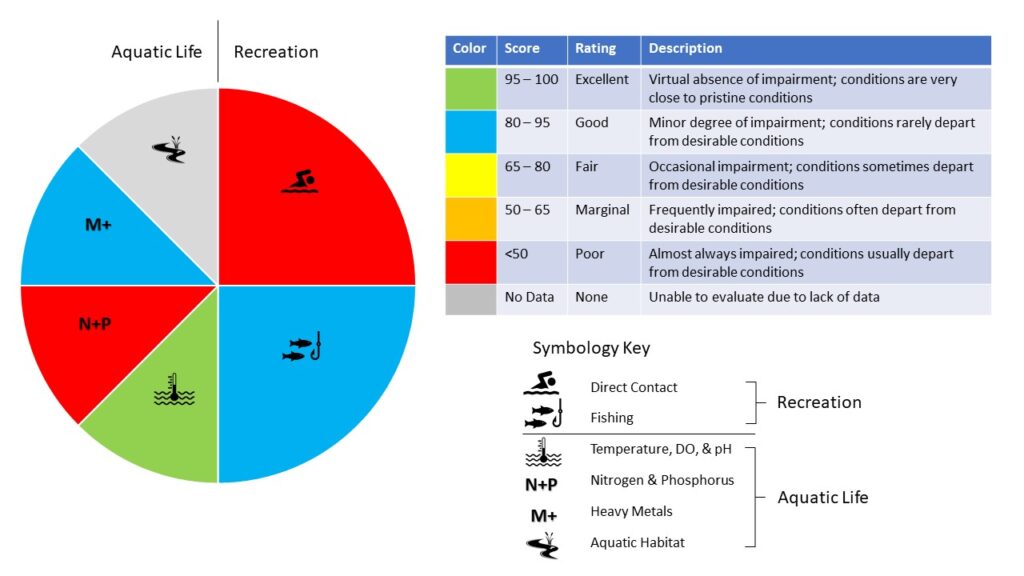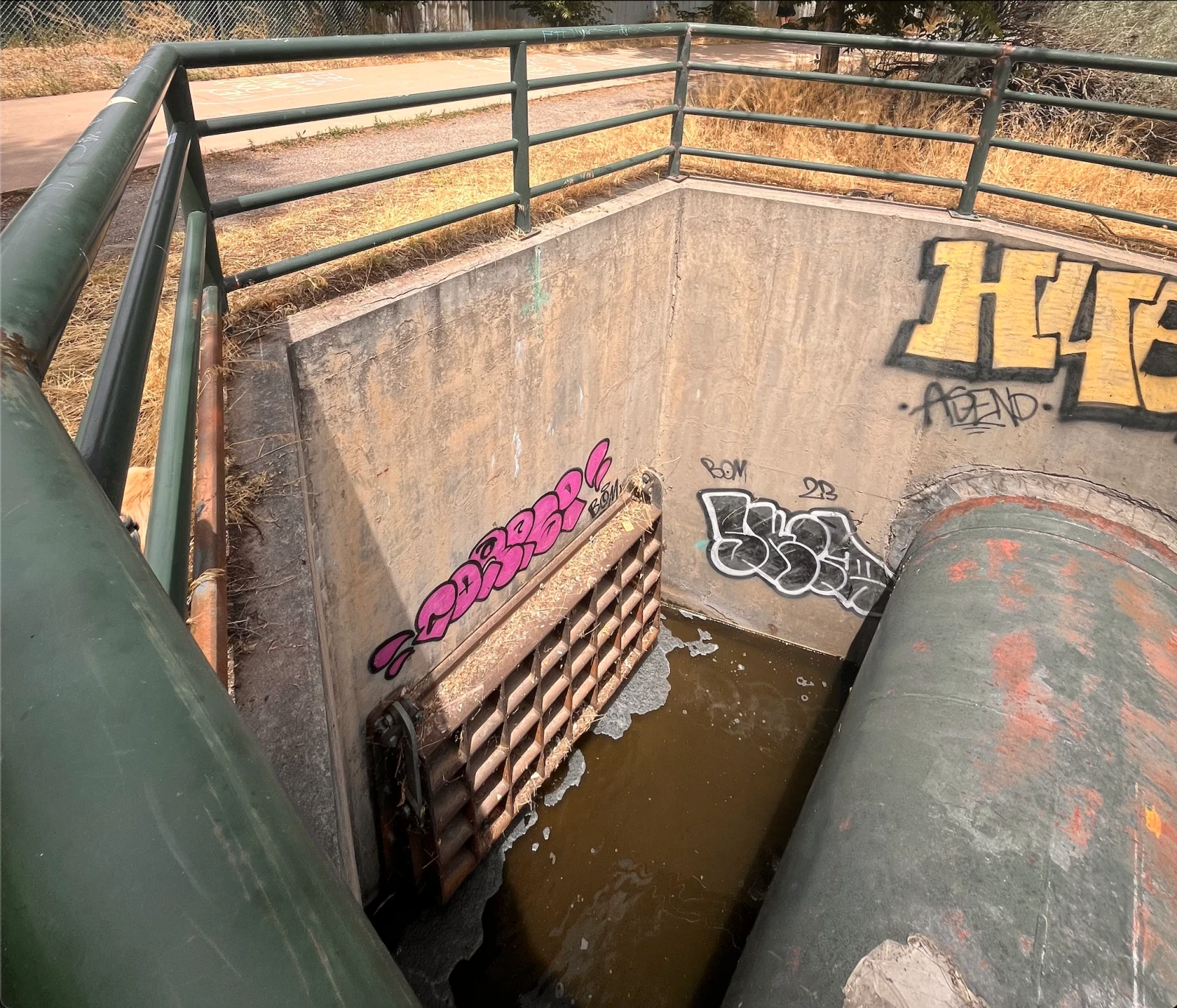This November, Denver voters will be asked to decide the fate of one of the worst industrial polluters in the city: Superior Farms. This is because of a ballot measure to ban slaughterhouses, formally known as Denver Initiated Ordinance 309, placed on the ballot by passionate volunteer petitioners. But are slaughterhouses really an important source of air and water pollution in Denver?
In general, in the United States, industrial slaughterhouses are considered one of the top sources of water pollution, contributing up to 27% of top pollutants like nitrogen, phosphorus, and E. Coli. These same pollutants are fouling up Denver’s South Platte River, rendering it unsafe for swimming, but the public is being kept in the dark about where these pollutants originate.
That’s because of an alarming fact: evidence shows Denver’s Superior Farms slaughterhouse has been openly disregarding its pollution reporting obligations under the federal Clean Water Act for more than four years.
Evading the Clean Water Act
In north Denver, Superior Farms Inc. operates the single largest industrial lamb slaughterhouse in the country. Located just 40 feet from the South Platte River, the Clean Water Act requires that Superior Farms obtain a discharge/stormwater permit limiting the amount of pollutants they can dump into Denver’s waterways. The law also requires that Superior Farms submit quarterly water pollution reports detailing exactly what they dump in the river.
For over four years, Superior Farms has failed to comply with the reporting requirements mandated by the Clean Water Act, according to the EPA website, resulting in “significant noncompliance” with the Act. This lack of transparency not only violates federal law but also leaves Denver residents in the dark about the potential health risks they face, leading the Emergency Planning and Community Right to Know Act to fine them $5,000 in 2021.

“Violation Identified”
Then, last year, the EPA updated their report on Superior Farms to show that, not only are they still failing to submit reports, but a “reportable noncompliance” has been identified at the plant. However, the EPA does not disclose any further information about the nature of this violation.

The Clean Water Act requires industrial facilities like slaughterhouses to regularly report their discharge of pollutants into local waterways. These reports are crucial for monitoring environmental impact and ensuring compliance with pollution limits. By ignoring these requirements, Superior Farms has effectively removed itself from public scrutiny and regulatory oversight.
Denver voters can only wonder why the EPA has not used its enforcement authority to fine Superior Farms for the “significant noncompliance” of failing to report, even after they have identified a “reportable noncompliance” at the factory. But available evidence suggests Superior Farms’ water pollution may be even worse than it first appears.
Former Slaughterhouse Worker Describes River Pollution
Jose Huizar, a lifelong resident of Denver’s Globeville neighborhood and former employee of the Superior Farms slaughterhouse, says feces is the main pollutant he saw entering the river from the facility. This is one of many reasons why Jose supports Denver Initiated Ordinance 309.
Superior Farms slaughters 1,500 lambs per day, making it the largest industrial lamb slaughterhouse in the country. Lambs waiting to be sent to the kill floor are kept in holding pens immediately adjacent to the river. Jose told us that he saw feces from these lambs get washed from the holding pens directly into the South Platte. He explained that while blood and gore from the kill floor were sent down an industrial drain, the facility didn’t have any system to prevent feces from the holding pens from cascading into the river.

The Consequences of Biological Pollution
Nationwide, feces, blood, and other biological materials are the main pollutants from slaughterhouses. These process into water systems as excess nitrogen, phosphorus, and E. Coli. Nitrogen and phosphorus are important nutrients in water systems, but at excessive concentrations, they lead to toxic algae blooms, killing off entire ecosystems. E. Coli is a virus that infects humans and wildlife, causing illness.
If Superior Farms were dumping organic materials into the South Platte River, we would expect to see elevated levels of nitrogen, phosphorus, and E. Coli. And that is exactly what the Denver Department of Public Health has found.
The River Tells the Tale
Recent water quality reports from the Environmental Quality Division at the City of Denver’s Department of Public Health & Environment paint a disturbing picture. Samples taken downstream from the Superior Farms facility show significantly higher levels of water pollutants compared to upstream locations. Specifically, levels of nitrogen, phosphorus, and E. coli – all common byproducts of slaughterhouse operations – are consistently above safe limits.

As a result of these elevated pollution levels, Denver considers the South Platte River unsafe for swimming and other forms of recreation. These findings strongly suggest that the Superior Farms slaughterhouse is a major contributor to the pollution of the South Platte River. However, without proper reporting from the facility, it’s impossible to determine the full extent of its impact.
Despite former Denver Mayor Michael Hancock’s goal to make the South Platte River swimmable by 2020, the city has failed to achieve this objective. Even though the city advises against it, many families, unaware of the potential dangers, continue to swim and play in the South Platte river, especially near the REI Flagship store. This is a major safety issue, but it’s clear that Superior Farms isn’t concerned about our local waterways and the health of Denver residents.
Environmental Racism and Air Pollution
The location of the Superior Farms slaughterhouse raises concerns about environmental justice. In fact, the EPA considers the Globeville neighborhood to be at extremely high risk of environmental racism. It’s no coincidence that this community of color (68% of residents are latine) is located in the most polluted residential zip code in the entire United States.

As one of Denver’s most racially diverse and economically marginalized neighborhoods, Globeville sits above the 90th percentile both in Colorado and nationwide for every category of pollution the EPA tracks. This fits with an established pattern where polluting industries are disproportionately placed in marginalized communities.

Moreover, the pollution issue isn’t limited to water. Slaughterhouses are known sources of air pollution, releasing particulate matter, ammonia, and other harmful compounds into the atmosphere. The lack of reporting extends to air quality data as well, leaving nearby residents exposed to unknown levels of airborne contaminants.
Anecdotally, the Superior Farms slaughterhouse is known to Globeville residents as a source of almost unbearable stench. While talking to voters in Globeville, Pro-Animal Future volunteers have heard many residents describe how the stench affects their lives. Some residents told us that they keep their windows shut all year round to try to keep out the foul odor, though it still creeps in. Local business owners told us how it is impossible to keep the smell out of their businesses.
A National Problem
The situation in Denver is not unique. Across the United States, slaughterhouses are major contributors to water pollution. The Environmental Protection Agency (EPA) has identified meat and poultry processing facilities as significant sources of nutrient pollution in waterways.
These facilities discharge large volumes of wastewater containing animal fats, blood, and other organic materials. When improperly treated, this wastewater can lead to algal blooms, fish kills, and contamination of drinking water sources.
In January 2024, the EPA proposed new water pollution rules that would exempt most slaughterhouses from updated standards. Environmental groups like Food & Water Watch argue these rules are inadequate, as they would only require pollution reductions from fewer than half of the meat processing plants discharging waste into U.S. waterways. This development underscores the importance of local action, as facilities like Superior Farms might continue to operate with minimal federal oversight, making Denver’s upcoming vote on the slaughterhouse ban even more crucial for protecting the South Platte River.
Inadequate Oversight
While the Clean Water Act provides a framework for regulating industrial water pollution, the case of Superior Farms’ Denver slaughterhouse demonstrates that these regulations are only effective when properly enforced. The fact that a major facility can ignore water pollution reporting requirements for years without consequence points to serious flaws in the current regulatory system.
Even when facilities do report, the requirements themselves may be inadequate. Many environmental advocates argue that current standards don’t fully capture the range of pollutants produced by slaughterhouses or their cumulative impact on ecosystems and human health.
A recent federal court settlement highlights just how inadequate the oversight of slaughterhouse pollution has been at the national level. In March 2024, the Environmental Protection Agency (EPA) was forced to update its outdated water pollution standards for meat and poultry processing plants, following a lawsuit by environmental groups. The EPA had not updated these standards in nearly 20 years, despite being required by the Clean Water Act to review them annually.
This systemic failure has allowed facilities like Superior Farms in Denver to operate with minimal accountability, potentially endangering public health and the environment.
If you agree that this negligence should not be tolerated, add your name to our petition to shut down Superior Farms’ Denver facility for good.

